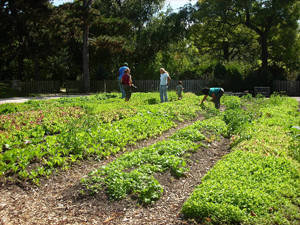
Imagine, at 60 or 70 years of age, you are forced to leave the country, town and home you have known all your life and move to different surroundings with a few family members and only a few belongings. You don’t know the language, the weather and living conditions are much different and you are entirely dependent on others. In addition, you may have been in a refugee camp for several months or even years, where conditions were crowded, unsanitary and often dangerous.
That was the situation faced by 185 refugees who were taken under the wing of Milwaukee’s Catholic Charities last year. Next year, it is expected that 220 will come to settle in this area. While Catholic Charities has programs in place for children and their parents to obtain schooling and work, the older men and women have little to lift their minds and hearts other than their family and immediate home surroundings. Many were farmers in their native countries and accustomed to providing for their families, but in this new place, they have no useful skills.
In an effort to improve the lives of the older refugees and give them hope and a sense of self-worth, Catholic Charities, in cooperation with the local non-profit organization, Growing Power Inc., began a program in late July. A 36-by 60-foot plot at the west end of Catholic Charities’ 50th and Lloyd parking lot provides small areas for 32 families to plant, nurture and enjoy the vegetables they may have grown in their native land.
“We wondered how to accomplish this with an urban garden, urban technology,” said Ricardo Cisneros, director of Family and Children Ministries at Catholic Charities. They contacted Will Allen, founder of Growing Power Inc., who was immediately interested.
Allen looked at the area behind the organization’s adult day care center and found it too shady with just a small open spot. Then Allen spotted the vacant parking lot and said, “Let’s grow a garden over there.”
Cisneros and Steve Xiong, director of migrant refugee services, were not convinced until Allen opened his computer and showed them the garden that he and his company had made on an old basketball court at Cabrini Green in Chicago.
“Then, they got it,” said Allen in a telephone interview, “and it was a matter of 45 minutes before we had ‘hammered out a deal’ and they were looking for the funding.
“We could use the parking lot and he told us it wouldn’t be necessary to remove the asphalt,” Cisneros said.
With the help of natural materials, a compost garden could be made right on top of the parking surface. Allen and his Growing Power crew provided consultation and technical assistance for the garden project, and prepared the 8-inch wood chip base, covered with 2-foot mounds of high density compost fertilized by thousands of worms.
By early August, the plot was ready to plant with vegetable seeds donated by Growing Power and selected by the refugees to blossom into crops like those in their native lands. A few weeks later, some of the mustard, beets, tomatoes, squash and greens familiar to the refugees had emerged and the harvesting could begin with greens for their family meals.
The seniors work the garden with family members in the afternoons and over the weekend. According to family members, their elders now have something to which to look forward, something that gets them out of the house. This, in turn, affects their moods positively, they have said. Having the grandparents, children and grandchildren work together is also a positive.
It gives the older people something physical to do with their hands and they can see the results, according to Cisneros. Otherwise they would be looking through their windows at an urban setting far different from the agricultural areas from which they came. Caring for their grandchildren while the parents work is often the only occupation they have here.
Catholic Charities established priorities for the garden. Refugees, current or recently former Catholic Charities clients older than age 60 with no access to any other gardening project, may garden at the plot. Individuals were recommended by one of the six Catholic Charities case managers as having problems of socialization or isolation. They include Hmong, Somali, Somali-Bantu and Burmese.
Another important outcome, according to Cisneros, is that they mingle with the other nationalities and learn that their situation is not unique, that others are going through the same things. This gives them solace in their adapting difficulties and adds purpose to their lives, he said.
“Older refugees kind of disappear into ‘I don’t know where,’” said Cisneros. “(The garden) increases their quality of life.”
Catholic Charities officials also hope that elderly refugees will avail themselves of the many services offered such as the nearby day care center which addresses social, psychological and medical needs.
“Growing Power has proven to be a good partnership with Catholic Charities,” said Cisneros.
“We feel this is a great project, a very good use of property and a symbol of what we are working for, a garden designed to draw older refugee families to our site,” said Jim Brennan, deputy director at Catholic Charities.
Allen noted that many of the greens will survive in the garden until the weather turns cold for more than a day or two. He hopes to cover the area with a tent-type greenhouse but that will take additional funding. Allen wasn’t sure that could happen this fall, but a winter greenhouse would provide year-round farming and harvesting and also a diversion during Wisconsin’s sometimes long and bleak winters.
Cisneros said Catholic Charities plans to expand the garden area in 2010 to enable more people to participate.
The garden was blessed and dedicated on Sept. 16 by Bishop Richard J. Sklba.
